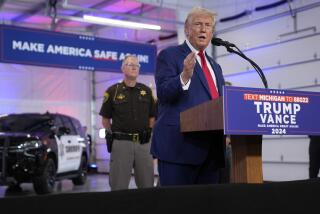Crowd Shouts ‘Shoot Them!’ Amid Calls for Trials, Purges : Revenge: Lawmakers and Russian leaders echo demands for action against ‘collaborationists.’
MOSCOW — From a Moscow crowd’s raucous cries of “Shoot them!” to mounting calls for purges in the army, media and government, the triumphant opponents of this week’s attempted coup turned increasingly Thursday to demands for the spoils of their victory and the savor of revenge.
In the Russian Federation Pardiament, which became the headquarters for the anti-coup forces, deputies lashed out against “collaborationists” and swore to break the power structures--the Communist Party, the KGB and the conservative military--that were behind the reactionary putsch.
“We have to demand that all the leaders and movements that took part in collaboration voluntarily retire,” Russian lawmaker Yevgeny Ambartsumov said. “Recent days have shown just who is who.”
Furthermore, he added, “Russia now has the right to top posts in the Soviet Union’s government.”
Acting Parliament Chairman Ruslan Khasbulatov, normally quite restrained, called for the Russian government to nationalize two of the Communist Party’s key headquarters buildings in Moscow, both prime pieces of real estate.
“As far as I’m concerned, as of today they belong to us,” he said.
And Russian President Boris N. Yeltsin assured a crowd of more than 100,000 supporters rallying outside the Parliament building: “The support of anti-constitutional actions cannot remain unpunished, no matter who was involved.”
He will replace all the local and regional leaders who supported the coup, Yeltsin said.
“Before, as well, these people waged a cold war against the Russian government, and now they should be removed from their posts,” he told the cheering crowd, some of whom held up signs demanding: “Put Them on Trial!” Others shouted “ Rasstrelyat !”--”Shoot them!”--when the members of the State Emergency Committee that tried to take over were mentioned.
One Russian deputy proposed that the Parliament look into liquidating the KGB entirely, saying the security agency could never be trusted.
A group of soldiers sent an appeal to Yeltsin begging him to clear the top ranks of the military of reactionary generals, and Yeltsin issued a decree ordering the Communist Party cells in the armed forces stationed in Russia disbanded.
“Party leaders in the armed forces directly supported the coup and participated in it,” his decree stated. “Party organs promoted the involvement of the military in a war against its own people.”
Yeltsin and other Russian leaders called on journalists in the 10 newspapers that the Emergency Committee allowed to keep publishing to oust their conservative editorial boards. The government newspaper Izvestia dumped its unpopular editor-in-chief, Nikolai Yefimov, and the correspondents of Moscow radio stations also reported that a purge was under way in their ranks.
Moscow authorities created a special commission to investigate exactly how various officials behaved during the coup attempt, and demanded that the Communist newspaper Leninskoye Znamya, or Leninist Banner, be closed down for its strong support of the putsch.
According to an announcement made at a Thursday night rally outside the KGB headquarters, Moscow Mayor Gavriil Popov also banned the city’s Communist Party branch, which has a membership of hundreds of thousands.
Khasbulatov even went so far as to demand that the property of the Communist daily Pravda and other Communist Party publications be nationalized.
Sergei Kovalev, a renowned human rights advocate and friend of the late Nobel laureate Andrei D. Sakharov, warned of the dangers of the “lust for revenge.” National legislator Yuri Ryzhov cautioned that if the government did not arrange civilized trials for all those accused of collaboration, it could “lose its image as a fledgling democracy.”
But they were far outnumbered by those calling for purges broad enough to prevent coups in the future.
Russian leaders launched a special attack against Anatoly Lukyanov, the head of the national Supreme Soviet, who did not openly declare himself in favor of the coup but also refrained most noticeably from opposing it.
Russian Prime Minister Ivan Silayev accused Lukyanov of being the “chief ideologist” behind the attempt, and said Lukyanov’s “humiliating” attempts Wednesday to persuade Soviet President Mikhail S. Gorbachev of his innocence sickened him.
Conservative members of the Russian Parliament also came under fire, with liberal lawmaker Leonid Gurevich complaining: “We see a lot of people here now who weren’t with us in past days. I think only those who have earned the right should be in the Presidium.”
As well as calling for trials for coup supporters, some signs and slogans at the rally were directed against Gorbachev, demanding that he resign.
One sign read: “Gorbachev, You Are No Hero and no Martyr,” reflecting the continued popular disapproval of the Soviet leader and a widespread tendency to blame him for the predicament that overtook him. Some members of the crowd even suggested that Gorbachev could have staged the whole coup drama for his own political ends.
Armenian leader Levon Ter-Petrosyan blamed Gorbachev as well, saying the Soviet president had brought the coup on himself by remaining dependent on reactionaries.
“The coup was committed by the same forces that Gorbachev leaned on for six years. He is not a victim of those forces, he is their creator,” Ter-Petrosyan said, according to the Russian Information Agency.
As eagerly as they pursued their enemies, members of the Russian Parliament sought to keep the line clear between the good guys and the bad.
Alexander N. Yakovlev, Gorbachev’s former adviser, warned the Russian Parliament: “Today and tomorrow, a lot of heroes will appear. I ask you to be very cautious about them. Otherwise the government could end up surrounded by the same scum as before.”
More to Read
Sign up for Essential California
The most important California stories and recommendations in your inbox every morning.
You may occasionally receive promotional content from the Los Angeles Times.










